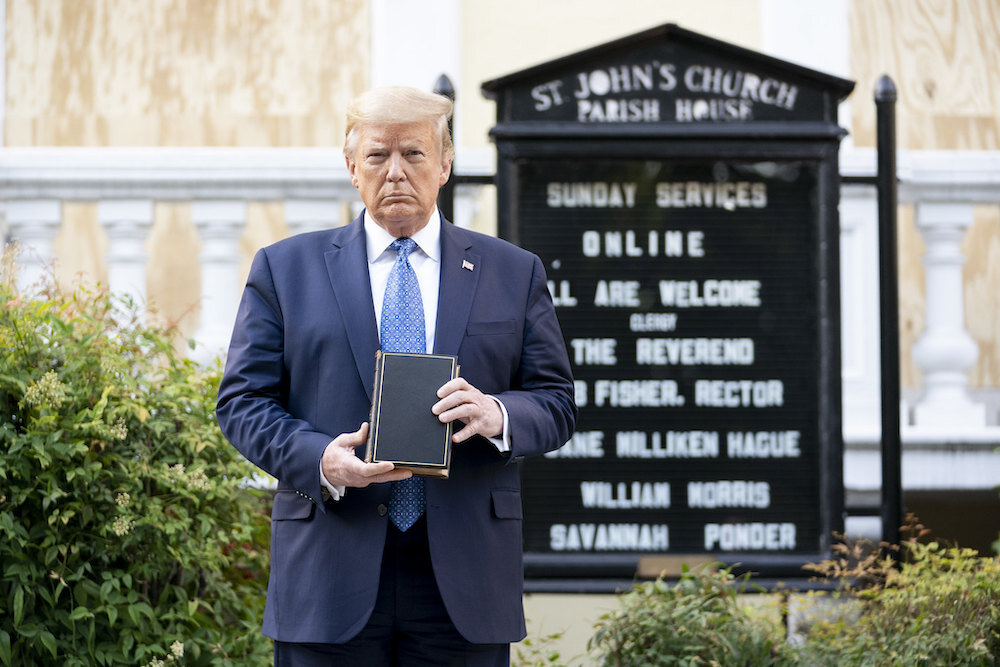President Trump’s Bible photo-op shows his ignorance of Jesus’ teachings
President Donald Trump holds a Bible in front of St. John’s Episcopal Church, known as the Church of the Presidents. Official White House photo/Creative Commons use.
(OPINION) On Monday, at approximately 7 p.m., a group of people including faith leaders were peacefully protesting for justice on behalf of George Floyd, the African American man who died while a Minneapolis police officer kneeled on his neck for approximately nine minutes on May 25.
Amid that peaceful protest, minutes before delivering a speech, the president deployed the District of Columbia police officers and military to forcefully push the protesters away with chemical irritants so that Trump could walk to the historic St. John’s Episcopal Church, escorted by at least 50 body guards, and take photos holding the Bible.
Read: The History Of ‘Church Of The Presidents’ Where Trump Posed With A Bible
The political use of the Bible in American discourse is not new. The Bible has been and continues to play a huge role in American life, as politicians advert to it in support of their interpretations of the Bible to support personal positions and public policy agendas. American politicians repeatedly use the tagline “God Bless America.” For centuries, the Bible has been used both to support peaceful protest and to incite deadly wars. During Trump’s speech, he used language such as “law and order,” “act of domestic terror,” “thugs” and “a crime against God” when describing the civil unrest and outcry that is happening throughout the country.
The speeches, writings and sermons of the Rev. Dr. Martin Luther King were filled with biblical inflection and images. In 1896, William Jennings Bryan gave speeches about “crucifying mankind on a cross of gold.” Prior to 1896, the Puritan settlers envisioned America as a “new promised land and a city on a hill.” While the president has invoked the Bible as a symbol to call for peaceful protest across the nation, he has blatantly refused to speak out against police brutality and the repeated murders of unarmed black and brown Americans.
While the murder of George Floyd ignited the current national outrage, other recent assassinations cry out for justice: Breonna Taylor, a young black woman, was killed by policemen on March 13 inside her Louisville, Kentucky apartment; and Ahmaud Arbery was killed by two white men on February 23 while jogging through a neighborhood in Brunswick, Georgia. Neither had committed any known crime.
To add insult to injury, neither of these cases were made public until they were exposed through video camera footage, and their killers were not initially arrested.
Although the president exploited the Bible as a symbol of peace, in the gospel Jesus displays anger by flipping tables and condemning the money changers and political governments who alienate strangers. Yet, although Trump invoked the Bible, he’s choosing to give more attention to the economy and burning buildings than to the black and brown bodies who are constantly killed by law enforcement. The president’s heinous zero-tolerance immigration policy, which incarcerates children, is another glaring example that goes against the teachings of the Bible.
In these examples, God does not just “feel” for victims; God sides with them, which is a seminal message throughout the Bible. Contrary to Trump’s hijacking of the Bible, it is imperative that seminary students, pastoral leaders and theologians remain committed to showcasing Jesus Christ as our example for seeking social justice. The same Jesus that declared “peace, be still” is the same Jesus who “overturned the tables.”
Dr. Antonio L. Ellis is an adjunct professor at Howard University in the Department of Educational Leadership and Policy Studies. He earned a master’s degree in religious studies at the Howard University School of Divinity and is an associate minister at Alfred Street Baptist Church in Alexandria, Virginia.
The Rev. Dr. Frederick D. Haynes, III is the senior pastor of Friendship-West Baptist Church in Dallas, Texas. He is the Trustee Chair of the Samuel Dewitt Proctor Conference; Board of Directors member of National Action Network; and Board of Directors member of the Conference of National Black Churches.

